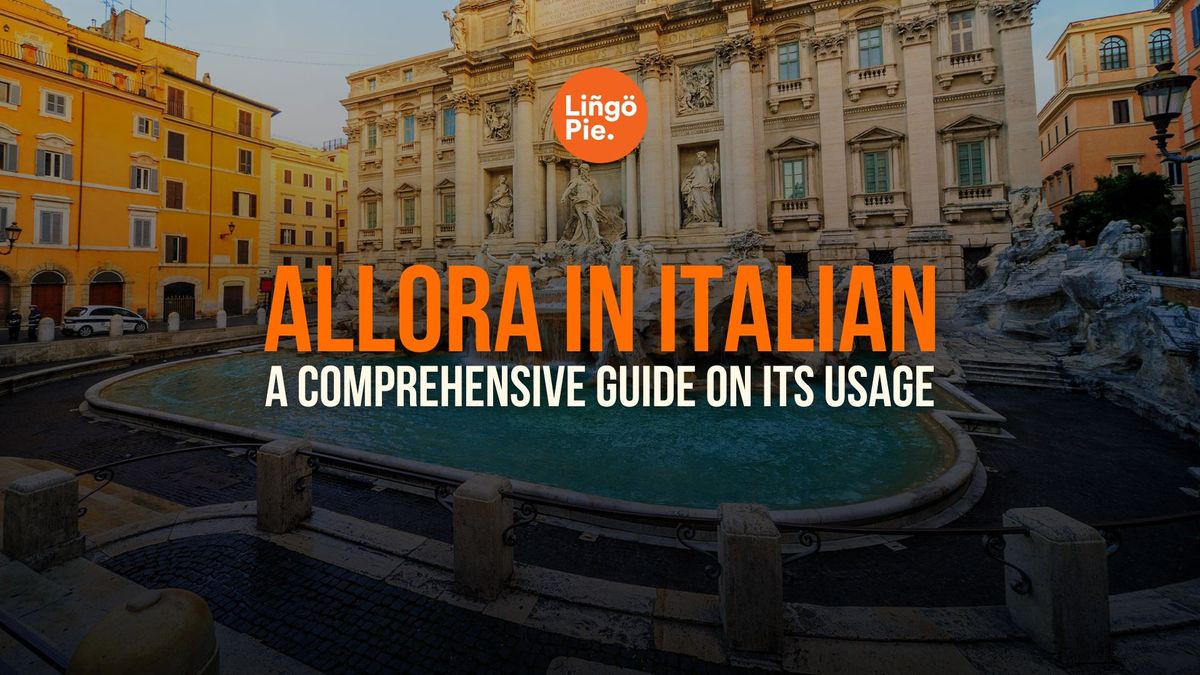Spend any time around Italian speakers, and you'll quickly notice how often they use "allora" in their conversations. This common word can mean "then," "so," or "well," or serve as a filler word when gathering thoughts – and it's exactly this flexibility that often confuses Italian language learners trying to master its usage.
Whether you're talking about past events, starting a discussion, or drawing conclusions, understanding how to use this word correctly will immediately improve your Italian fluency. So in this post, we'll break down the 4 key meanings of allora in Italian to help you use it confidently in any situation.
- Learn Italian Slang with the Sopranos
- 20+ Terms For Accommodation In Italian
- 20 Italian Text Slang To Sound Like a True Native

What Does Allora Mean In Italian?
"Allora" is a versatile Italian adverb and conjunction that originated from the Latin phrase "illa hora," meaning "at that hour." While its literal translation connects to time ("then" or "at that time"), modern Italian has evolved the word far beyond its temporal roots. You'll hear it constantly in Italian conversations - starting sentences, connecting ideas, referring to past events, or simply filling brief pauses while speaking.
Allora as a Sentence Starter ("Well/So")
Just like English speakers often begin sentences with "well" or "so," Italians frequently start their thoughts with "allora." It's particularly useful when you want to grab attention, change topics, or begin explaining something. For example, "Allora, cosa facciamo stasera?" ("So, what are we doing tonight?") or "Allora, ti spiego io" ("Well, let me explain").
While "allora" is perfect for starting conversations or introducing new ideas, it's not meant to be used mid-sentence when you're hesitating or thinking. Save it for those confident conversation starters, and you'll sound more like a native speaker.
| Conversation | Translation | Context |
|---|---|---|
| A: "Allora, come sta tua sorella?" <br>B: "Sta meglio, grazie." | A: "Well, how's your sister?" <br>B: "She's better, thanks." | Starting a conversation |
| A: "Allora, facciamo un piano." <br>B: "Sì, sono d'accordo." | A: "So, let's make a plan." <br>B: "Yes, I agree." | Beginning a discussion |

Allora as "Then"
"Then" is one of the most common translations of "allora," and it helps Italians talk about time in several ways. You can use it to show a sequence of events: "Ho finito il lavoro, allora sono andato a casa" ("I finished work, then I went home"). It's also perfect for talking about the past, painting a picture of how things used to be: "Allora non c'erano i cellulari" ("Back then, there weren't any cell phones").
And when you want to express how long something has been happening, "da allora" means "since then" - "Da allora, vivo a Roma" ("I've been living in Rome since then"). Think of this use of "allora" as your time-travel word in Italian, helping you move between past and present in your stories.
| Conversation | Translation | Context |
|---|---|---|
| A: "Com'era Roma nel 2010?" <br>B: "Allora vivevo vicino al Colosseo." | A: "How was Rome in 2010?" <br>B: "Back then I lived near the Colosseum." | Describing past situations |
| A: "Da allora non l'ho più visto." <br>B: "Davvero?" | A: "Since then I haven't seen him again." <br>B: "Really?" | Referring to a time period |
Allora as a Standalone Expression
"Allora?" can also be used as an expression in itself. As a question word, it's like saying "Well?" or "So, what's happening?" - perfect when you're waiting for news or an answer: "Allora? Come è andato l'esame?" ("Well? How did the exam go?").
However, you can also hear friends greet each other with an enthusiastic "Allora!" - especially when they haven't seen each other in a while and are eager to catch up.
The best part? "Allora" can also be used with a firm tone as a warning - similar to how English speakers might say "Well then!" when they're running out of patience.
| Conversation | Translation | Context |
|---|---|---|
| A: "Ho pensato a una soluzione." <br>B: "Allora?" | A: "I thought of a solution." <br>B: "Well?" | Prompting for information |
| Parent: "Allora!" <br>Child: "Ok, ok, lo faccio." | Parent: "Well then!" <br>Child: "Ok, ok, I'll do it." | Warning tone |

Allora as "So" (Cause and Effect)
"Allora" is perfect for connecting causes with their consequences, just like "so" in English. You might say "Piove, allora prendo l'ombrello" ("It's raining, so I'll take an umbrella") or "Non ho studiato, allora non ho superato l'esame" ("I didn't study, so I didn't pass the exam"). This use of "allora" helps you draw conclusions and explain why things happened: "Sei stanco, allora vai a dormire" ("You're tired, so go to sleep").
| Conversation | Translation | Context |
|---|---|---|
| A: "Ho fame." <br>B: "Allora andiamo a mangiare." | A: "I'm hungry." <br>B: "So let's go eat." | Logical conclusion |
| A: "È tardi." <br>B: "Allora devo andare." | A: "It's late." <br>B: "So I have to go." | Natural consequence |
Why Is Allora Challenging to Learn?
Learning to use "allora" naturally can be tricky because it doesn't have a perfect one-to-one translation in English. While English speakers need different words for different situations, Italians can rely on this single word to do all these jobs.
What makes it even more challenging is timing and context - knowing exactly when to drop an "allora" into conversation comes from exposure and practice, not just memorizing rules. Many learners either overuse it, trying to make it fit everywhere, or feel hesitant to use it at all, worried they'll use it incorrectly.
Our advice? Start with one usage at a time and gradually expand as you become more comfortable with each meaning.
How to Master Allora Like a Native Speaker
While textbooks can teach you the basic rules, hearing how native speakers use "allora" in different contexts helps you understand its subtle nuances and correct timing. Watching Italian movies and TV shows is an excellent way to pick up these natural patterns - you'll hear how Italians use "allora" to start conversations, tell stories, or express reactions in real-life situations.

With Lingopie, you can make this learning process even more effective. The platform offers a wide selection of Italian content with interactive subtitles, allowing you to hear "allora" used in context while following along with accurate translations.
Whether it's a heated argument in an Italian drama series or a casual conversation in a sitcom, you'll start recognizing patterns in how native speakers naturally incorporate "allora" into their speech. Plus, you can replay scenes as many times as needed to perfect your understanding of when and how to use this versatile word.
Start Using Allora with Confidence
Understanding "allora" is a key step toward speaking Italian naturally and fluently. While it might seem tricky at first with its multiple meanings, remember that context is your best friend. Start with one usage, practice it until it feels natural, and gradually add the others to your conversation skills.
Ready to hear how native Italian speakers use "allora" in real conversations? Try Lingopie's extensive library of Italian TV shows and movies today. With interactive subtitles and an immersive learning experience, you'll be using "allora" like a native speaker in no time.
Start your free trial now and transform the way you learn Italian!







![How Many Italian-Speaking Countries Are Out There? [2025 Data]](/blog/content/images/size/w300/2025/06/Italian-speaking-countries.jpg)


